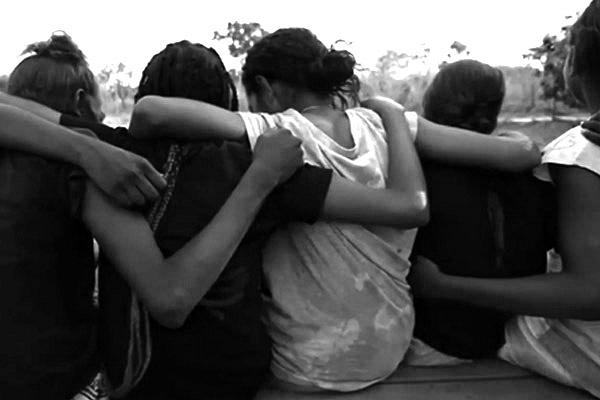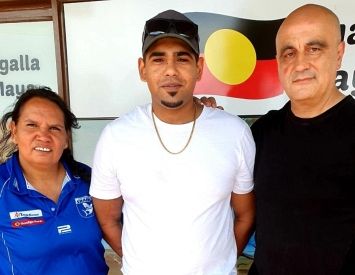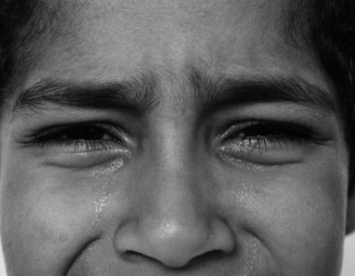Gerry Georgatos reflects on a funeral he attended of a 19-year-old lost to suicide, an event that affected him profoundly.
OUR TIME ON THIS EARTH is a short stretch. Everything comes to pass. Some of what we vainly chase or let stress us are not what this brief stretch of life should include. Last Thursday, I attended the funeral of a young life, 19 years of age, lost to suicide. Sadly, I have attended many funerals of young people lost to suicide and for the first time, as he was lowered, I cried. In fact, I sobbed.
I have an aversion to funerals and avoid them wherever possible. I do not see a burial plot as some loving place for the final rest. I have never understood why we celebrate the dead. Some call it grieving. In my near six decades of life, I have only ever been to four familial funerals. The first funeral I attended was of my paternal grandfather in Greece, 1971. I was nine years old and we only made the last eight hours of his life, in time for his last words and breaths. It was a drop-everything trip that took us halfway across the world to his humble home on an island mountain village.
My father left his mortal coil six years ago and I journeyed across the continent for the last 22 days of his life for a bedside vigil. My mother and I were the only two with him in his last hour when he left on an Easter Friday. My father’s loss hurt wildly but I did not cry at the funeral or in front of anyone. I never do
Other than two more familial funerals, the only other funerals I have attended were tragically of children and youth who took their lives. In 2015, in an Australian regional town, I attended three funerals in five days of young ones. Three graves in a row — all suicides. My heart bled, but I did not cry publicly. Sometimes the emotions threaten a cry; stoically, I hold.
Last Thursday, a 19-year-old was lowered and all of a sudden, I was consumed by unbearable grief and I sobbed. I fought to stop the crying, but the strength I have always lived publicly wilted in those very long seconds and I sobbed uncontrollably.
I have spent the last decade supporting the young and old in improving their life circumstances. I work mostly with people living below the poverty line and across the range of issues. I have worked extensively with suicidality and in suicide prevention, and where possible, in supporting young and old to transform their lives. I have lived through young lives lost and other young lives at risk of being lost, every day of the last decade.
On the day this 19-year-old boy was lost and his name came to my attention, I was distraught. I remembered him as a five-year-old, as a six, seven and eight-year-old when I last saw him. His name was Stanley. He would come with his mum to the university I worked at, while mum was studying Education, fighting to lift herself and her family out of intergenerational poverty. My only daughter, Connie, spent much of her early years on campus with me, a “uni-brat”. Stanley and Connie are the same age. They used to play with each other, they used to seek each other out. I remember their two faces looking at me from behind a desk.
We are not on this Earth to bury our children, but it happens. We have to always keep solid and this is an insistence.
I was probably the most prolific writer in the country on suicidality during the last decade, however, I have slowed down and almost to a halt. Not because of my battle with Parkinson’s Disease, I have slowed down for the same reason I sobbed — because I was overwhelmed. Surely, this journey, life as brief as it is, must count. Surely, life must be about living, enjoying each other, thriving in happiness, the helping hand and kindness to everyone we meet.
I remember everyone lost to suicide, but foremost, I remember those lost to suicide that we could have helped if we had been resourced to do so. I have been fortunate these last 16 months, that my lifelong modest living allowed me to work pro bono, leave a Commonwealth-funded national taskforce where I co-ordinated the responders to the tragedy of suicides and instead have the opportunity to in-road into suicide prevention through outreach — working alongside thousands and, pray thanks, never losing anyone.
I sobbed uncontrollably because most of the suicides of children and older were preventable. I sobbed because of the years of battling narratives, battling governments, battling bureaucracies, battle after battle. I was all of a sudden broken as I watched young Stanley lowered. I saw a little boy buried, who once played tirelessly with my little girl.
I am not angry at the world, I never am. I try and see through two sets of eyes. I have seen crushing poverty, abject, throughout this world. It is the horrendous lie of our generation that we are lifting sisters and brothers, the world over, from poverty — eight out of every ten human beings on this planet live poor.
It is unfair that Chad has a life expectancy of half a century — half-lives. It is unfair that a small population, Australia, a greedy economic power, leaves behind sisters and brothers unheard. It is unfair that governments actually do not care. This is my experience. It is unfair that suicidality is described ludicrously as “complex”. The ways forward are there. The listening is not. So it goes.
Gerry Georgatos is the national coordinator of the National Suicide Prevention & Trauma Recovery Project. Gerry can be contacted at coordinator@suicidepreventionnationnal.com.au or you can follow Gerry on Twitter @GerryGeorgatos.
Related Articles
- The fight for the future of the Pilbara
- Dickensian Australia — homeless orphans and ten-year-old children gaoled
- Suicide toll may decrease for Australia overall but not for First Peoples
- The shocking truth of Australia's Indigenous incarcerated
 This work is licensed under a Creative Commons Attribution-NonCommercial-NoDerivs 3.0 Australia License
This work is licensed under a Creative Commons Attribution-NonCommercial-NoDerivs 3.0 Australia License
Support independent journalism Subscribe to IA.














